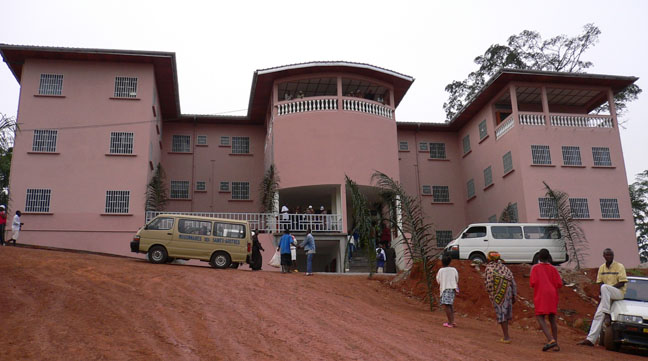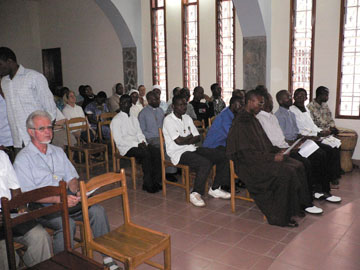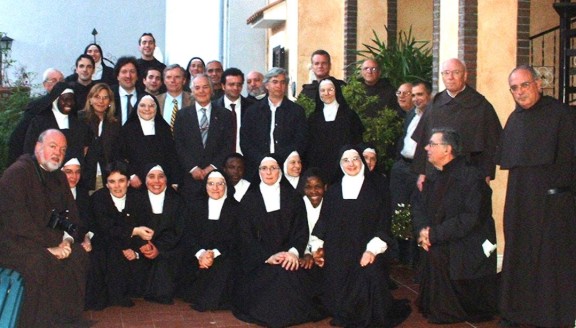|
no. 2 april - june 2005
Cameroon Foundation Grows To Maturity with New Formation House The new student house in Yaundé-Nkolbisson was blessed and officially opened during a solemn celebration by the retired bishop of Bafia in late February 2005. The building sits on 1.5 hectars of land purchased by the Carmelites. Pankraz Ribbert, then Prior Provincial of the Lower German Province, blessed the 30 rooms of the new building. Joining in the celebration were the construction workers, members of the Donum Dei, Lay Carmelites and some of the many friends and supporters the Carmelites have gained during their short time in Cameroon. Dedicated to Our Lady of Mount Carmel, the "first brick" of the new building had been blessed by the Prior General, Joseph Chalmers, on March 19, 2004. The Carmelite presence in Cameroon began thanks to the interest of the members of the Provincial Commissariat of the Congo. After visits beginning in 1997 by Jean Marie D’Undji, the then Commissary and a later visit by Congolese Carmelite François Alirac, a number of Cameroonese joined the Order in the Congo. At one time part of the European colony in West Africa, Cameroon became a republic in 1960. The country is in the shape of an elongated triangle and forms a bridge between West Africa and Central Africa. A country of 15.2 million people, it is bordered on the north by Lake Chad; on the east by Chad and the Central African Republic; on the south by the Republic of the Congo, Gabon, and Equatorial Guinea; and on the west by the Bight of Biafra (a part of the Atlantic Ocean) and Nigeria.
In October 2000, three more Cameroon pre-novices were selected to go to Congo but were unable to reach Bunia because of the civil war in Congo. In March 2001, a meeting of the Priors Provincial of Lower Germany, Italy, and the Commissary Provincial of the Congo met to work out the details of the foundation. The foundation was entrusted to the Lower German Province with members of the Italian province providing the formation. By the end of June 2001, the Archbishop of Yaundé gave permission to establish a scholasticate for the Cameroonese students of philosophy and theology. The following month, the Lower German Province bought 10 hectars of land, approximately 1km from the parish, and established the novitiate there. On September 3, 2001, the first community of the Carmelites officially began with two members of the Italian Province, Nestor Ndjango, François Alirac, and three novices. Seven days later three pre-novices of the Congolese Commissariat arrive. Nine days later, three newly professed members of the fledgling foundation arrived from the Congo. In October Ubaldo Pani, of the Italian Province, arrived from Rome to become the new superior and director of novices. By December 2003, a Centre de Santé (Health Center) had been established in Efulan and by mid February 2004 the magazine "Flos Carmeli" had been established. These two ventures allow the Carmelites to reach out to the people and explain Carmelite spirituality beyond the parish setting. The first community has been trying very hard to become self-sufficient by harvesting banana and palm oil trees and raising pigs and chickens (see following article on the Society of the Little Flower – Ireland/UK). At present in the Carmeroon mission, there are four Carmelite priests, 1 solemnly professed from the Congo, 15 simply professed, four novices, and six postulants. The website of the German Provinces: www.karmelitenorden.de Photos: 1) The new student house in Yaundé-Nkolbisson, Cameroon was dedicated by the retired Bishop of Bafia in February 2005. The fledgling mission of the Lower German Province has 30 members. (Photo courtesy of the Lower German Province) 2) Some of those who participated in the dedication of the new student house in Cameroon. Fr. Ubaldo Pani, the local superior, wrote that the new house, situated on a hill and visible from the entire area, must radiate the witness of religious life to the people of the whole area. (Photo courtesy of the Lower German Province) Little Flower Helps Self-Sufficiency, New Construction in the Missions The generosity of the members of the Society of the Little Flower in Ireland and the UK has provided startup money for projects which will allow the missions to become self-sufficient financially. In Cameroon, the Society funded the purchase of 500 hens, several pigs, and 100 palm oil trees. While the trees will take some time to grow and mature, the hens have already begun producing. It was not an easy start for the hens however. "I learned that chickens have to feel at home before they will lay eggs. For a few days, we thought that our hens were on strike! We went to find eggs but came away with nothing," said Joseph Chalmers, the Prior General. For the ceremony inaugurating the new monastery of Carmelite nuns in Kenya, the local bishop gave ten goats for the feast that everyone enjoyed followed the Mass. The Society members also helped with the construction of a house for the Carmelite novices in East Timor. "It is an extremely poor country but Carmelite life is flourishing," reports the Prior General. The Prior General reports a welcome change in the hens of Cameroon. "The hens obviously feel very much a part of the Carmelite mission now. They are doing their bit to help feed the young Carmelites. The remainder of the eggs goes to market and the local people appreciate the Carmelite hens." Antilles Commisariate Celebrates Annual Assembly On January 24 – 27, 2005 the members of the Provincial Commissariat of the Antilles celebrated their annual assembly. The meeting was held at the Schoenstatt Sanctuary in Cabo Rojo, Puerto Rico. The Prior Provincial David Oliver and the major part of the solemnly professed participated. As preparation for the Provincial Chapter, the reflections and discussions centered on the document from the Chapter Preparatory Commission and the presentation of some of the Provincials of the Iberian Region of the Order. An analysis of the reality of the Commissariat was made regarding the situation of the communities, the ministry that is done, the participation of the laity, and the development of vocational ministry. The meeting studied the provincial plan which described the Carmelite identity as the place from where pastoral commitments could arise and which could be a renewing element in the life of the communities. Each of the people responsible for some aspect of the Assembly and the priors presented a report on the last three years. The final report was from Fr. Tomás Ciscar, Commissary of the Antilles, who gave a vision of the life of the communities during these years, mentioning the deceased religious, and thanking everyone for the work that has been done during his term of office. Fr. Tomás also highlighted some of the difficulties and the accomplishments achieved. Among the obstacles the growing individualism creates difficulties in the community life and as the greatest achievement, he highlighted the willingness of the brothers to pitch in. The Bishop of Mayagüez, Ulises Casiano, shared a dinner with the group on the 26th. It is always a pleasure to have him with us. His presence has become a tradition. These days were a time of brotherhood, of meeting the Lord, and of being with the brothers. David Oliver, O. Carm. Website of the Argo Valentine Province: www.carmelitasav.org
Joseph Chalmers, the Prior General of the Order, has sent a letter about the life of Madre Crocifissa to the members of the Carmelite Family. Entitled "That Carmel May Bloom," the letter is his reflection on the meaning of Madre Crocifissa’s life for Carmelites today. "In view of the forthcoming beatification of Madre Maria Crocifissa Curcio, foundress of the Carmelite Missionary Sisters of St. Thérèse of the Child Jesus, I want to share with the whole Carmelite Family some of the riches to be found in this sister of ours," wrote Fr. Joseph. The beatification of Madre Crocifissa was to be celebrated in St. Peter’s Square on April 24, 2005. Due to the death of Pope John Paul II, all such events were cancelled and will be rescheduled. The inauguration of the pontificate of the new pope, Benedictus XVI, was celebrated at St. Peter’s on April 24 instead. "I actually realized that I knew very little about Madre Crocifissa. But after I read a biography of her, I am convinced that she is a real mystic," said the Prior General. "Her every day life can be a great inspiration to all of us who have this call to Carmel." While she had a great love and knowledge of Carmelite spirituality, Madre Crocifissa also has a deep experience of God’s presence. "It would seem clear from the writings of Madre Crocifissa that she did indeed ‘taste somewhat in the heart and to experience in the mind the power of the divine presence and the sweetness of heavenly glory,’" Fr. Joseph writes in his letter. A member of the Carmelite Third Order at a very young age, Madre Crocifissa found support for her spiritual growth from the Lay Carmelites. She began to sense her vocation to "reinvigorate Carmel in our land (Italy) and many others." The Congregation of the Carmelite Missionary Sisters of St. Thérèse of the Child Jesus today minister in Italy, Tanzania, Brazil, Canada, Malta, The Philippines, and Romania. The Congregation is headquartered at Santa Marinella, just outside Rome, Italy. There are approximately 300 members. The Congregation was founded on July 3, 1925 and affiliated to the Carmelite Order two weeks later on July 16, the Feast of Our Lady of Mount Carmel. As soon as the new date for the beatification of Madre Crocifissa is known, it will be published on the website of the congregation as well as through CITOC-online. The website for the beatification of Madre Crocifissa:
www.madrecrocifissa.org
On Saturday, April 23, 2005, the final celebration of the 25th Anniversary of the foundation of the Carmelite monastery of "Santa Anna" in Carpineto Romano was held. The Eucharist was led by Bishop Lorenzo Loppa, Bishop of Anagni-Velltri and concelebrated by a number of priests. Participating were Carlo Cicconetti, Vice-General of the Order, Bishop Vitalis Wilderink, O. Carm. Bishop emeritus of Itaguaí, Brazil, Falco Thuis, Prior General when the foundation was made, Claudio Bellotti, Prior Provincial of the Italian Province, members of the General Council, Carmelites as well as other diocesan priests. Also present were Carmelite students of the Italian Province. Following the Eucharist, there was a concert on the Gospel parables by song writer Marcello Marrocchi. (Photo courtesy of the Carmelite monastery of Carpineto Romano) |
|
RETURN TO THE INDEX FOR 2005 | RETURN TO THE INDEX FOR THIS ISSUE INDEX OF CARMELITE
WEBSITES |


 When the bishop of Mbalmayo required the administration of a parish as
a sine qua non for establishing a Carmelite novitiate, the Carmelites
began administering the small parish of St. Joseph in Efulan, a town of
3,000 inhabitants. Efulan is located approximately 17 km north of Mbalmayo
on a national highway.
When the bishop of Mbalmayo required the administration of a parish as
a sine qua non for establishing a Carmelite novitiate, the Carmelites
began administering the small parish of St. Joseph in Efulan, a town of
3,000 inhabitants. Efulan is located approximately 17 km north of Mbalmayo
on a national highway.
